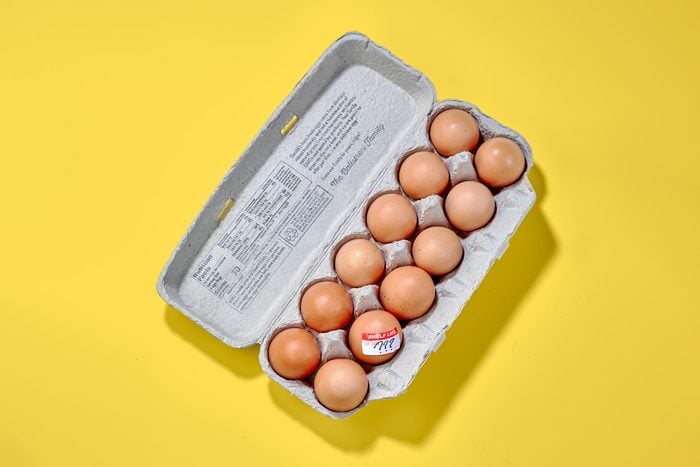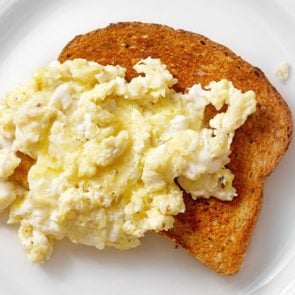Is It Safe to Eat Expired Eggs?
Updated: Jan. 18, 2023

Has that carton of eggs been languishing in your fridge? Here's everything you need to know about whether eggs expire and how to tell if they're safe to eat.
Like everything else these days, grocery prices are rising fast. As we look to save money and reduce food waste, many of us are taking second glances at the sell-by date printed on the sides of packages, questioning how far we can stretch our food. And with prices cheaper by the (multiple) dozen, eggs are no egg-ception. But all that stocking up has us staring down our unopened cartons, wondering, Do eggs expire?
Knowing how to tell if eggs are still good can seem like a skill reserved for top chefs. For us mere mortals, who worry about removing eggs from the carton wrong and whether the stringy white stuff in eggs is supposed to be there (it is), there’s the complicating fact that eggs are dairy. Considering how long milk lasts, how seriously should we take the expiration date for eggs? Are the rumors that they’re one of those foods that never expire true? And most important: Is it worth it—or even safe—to stock up on eggs if they’re going to sit for a while?
For all these questions, we have answers. And best of all, you’re going to like them. True to the unforgettable 1976 campaign, the eggs chilling in your fridge are likely still both incredible and edible. Regardless of whether they’re white, brown or speckled, still covered in bloom from your backyard hens or stamped with your favorite brand’s logo, eggs that are treated properly will remain safe to eat until you’re ready to get cracking.
How long are eggs good for after the expiration date on the carton?
Much, much longer than you think. Conservative guidelines say that eggs retain their peak quality three to five weeks beyond their sell-by date when kept raw, in their unwashed shells, and stored properly—meaning in a chilled location but not in your refrigerator door.
And bear in mind, that’s three to five weeks on top of however long they sat on the store shelf. According to the U.S. Department of Agriculture, eggs can be sold for up to 30 days after they were packaged. So when your eggs’ expiration date has passed, they could be two months old—and still more than likely safe to eat.
It’s important to note, however, that expiration dates have been outmoded; sell-by and best-by dates are simply quality indicators, not safety guides. So, technically speaking, do eggs expire? Not by federal regulations!
Farm-fresh eggs have an even longer window for high quality. According to Lisa Steele, a fifth-generation chicken keeper and author of The Fresh Eggs Daily Cookbook, they’ll stay in top form for as long as three months. That means they’ll retain their creamier, richer-colored yolks beneath their thicker-than-commercial shells that whole time, provided you refrigerate them immediately and don’t wash them. That applies to brown, speckled and white eggs, all of which are naturally occurring and have nothing to do with organic practices that make certain eggs more expensive than conventional white ones.
But do all eggs need to be refrigerated? Well, while some people may choose to keep their freshly laid eggs at room temperature—a practice that is safe if you keep the eggs away from potential bacterial contaminants—Steele has found they last seven times longer when chilled.
Crack them open, though, and the clock starts ticking. Here’s how long they’ll last out of the shell:
- Raw egg whites and yolks: Per Egg Farmers of Canada, separated raw whites and raw yolks should be used within four days and ought to be held in airtight containers.
- Pasteurized liquid egg products: These are safe to eat up to 10 days after opening.
- Cooked egg dishes: Store these in an airtight container for up to four days.
- Hard-boiled eggs: This cooking method will buy you a few days more, up to a full week.
- Scrambled eggs: For the longest extension, scramble whole eggs and freeze them for use within four months. But they have to be mixed! Their separate components don’t freeze well, and the USDA does not recommend freezing raw eggs in their shells for quality reasons. Any raw, uncracked eggs accidentally frozen in their shells must be used immediately after thawing in the refrigerator.
If it’s not an expiration date, what does the date on the carton mean?
Your egg carton is stamped with multiple numbers. First is a date, which is almost always a sell-by date, or the day by which a grocery store has to pull an item off the shelves. The thing is, this is centered around quality and freshness rather than safety or health concerns.
There’s another number on the carton: a three-digit code called the Julian date. It’s the day your eggs were put into the carton. It might take you a minute to work out the exact date—it corresponds to the calendar year and ranges from one to 365. So 001 would be Jan. 1 and 365 would represent Dec. 31.
Like sell-by dates, Julian dates are most useful for determining freshness and can help you determine just how to use the eggs in your fridge. Whipping up a batch of delicious scrambled eggs? Go with fresh eggs. Creating a meringue? Reach for older eggs.
Look, we know how stressful grocery shopping can be, but checking the Julian date is an extra step worth taking. If you don’t want to whip out your calendar and calculator (we don’t blame you), here’s a general rule of thumb to follow: If you’re buying eggs in early to mid-January, look for lower numbers (015 will be significantly fresher than 364). If you’re buying eggs later in the year, look for the highest number possible.
Should you wash your eggs?
This one’s easy: absolutely not. Whether they’re farm bought or store bought, you should never, ever wash your eggs. As with washing raw chicken, washing eggs can actually increase the risk of contamination.
How does this work? Well, freshly laid eggs are coated with a natural bloom, or cuticle, that seals off the fragile, porous shell and prevents bacteria from entering. Farm eggs retain this natural protective layer, which is excreted by a special gland in the hen that turns her vent (the opening through which she lays an egg) inside out to keep the egg clean and separate from her waste passages. Commercially produced eggs don’t have this shield because the USDA requires them to be sanitized in a special, highly regulated hot-water solution, but they are coated with mineral oil as a restorative.
Washing your eggs at home removes any protection they have, allowing more air to get into the eggs, which will degrade their quality; providing gaps through which bacteria like salmonella can enter; and actively sucking in contaminants from your water.
What happens if you eat expired eggs?
Provided the egg isn’t contaminated, nothing bad will happen. Because do eggs expire? Nope. Remember, sell-by, use-by and best-by dates aren’t federally regulated for any foods except infant formula. The expiration date on your carton of jumbo eggs is just there to ensure quality. So if you crack ’em open after the date has passed, you may notice they don’t taste as good, but you’re not at risk of illness.
In short, you can eat eggs two months out of date. It’ll be fine.
If you eat an outright bad egg, that’s a different story. Eggs pretty exclusively spoil from contamination, and the signs and symptoms are pretty clear if you consume an egg that’s been harboring salmonella. You’ll develop side effects such as diarrhea, vomiting and fever within 12 to 72 hours after eating, but the Centers for Disease Control and Prevention warns that symptoms may be delayed by weeks following exposure. The CDC also warns that you may remain actively sick for four to seven days; bowel changes may linger beyond that. Reactive arthritis in the form of joint pain and inflammation may also develop, but fortunately, those cases are relatively rare.
How can you tell how fresh an egg is?
Because eggs aren’t one of those foods you should toss after their expiration date, the biggest question isn’t “Do eggs expire?” Instead, you should be asking how to determine if an egg is at peak freshness.
There are a few quick tricks you can try. A popular option is to drop it into a bowl of water and see if it floats. If it does, that means it’s an older egg that air has had a chance to get into. Eggs that sink to the bottom and lie flat are as fresh as can be, while those that stand on one end are good but not great. All are still safe to eat, according to the USDA, as long as they pass the safety checks we outlined.
Or try the shake test. If you hear or feel sloshing when you shake the egg, the yolk has become watery. While it’s safe to eat, it’s not as fresh as a silent egg.
You can also look to the spread of the egg white in the pan. The wider it is, the older the egg is. It won’t taste different from a younger egg, but you may want to take measures to keep it in a more restrained form, like by placing a cookie cutter in the pan and cracking the egg into it.
Then there are the red herrings—anomalies you can confidently ignore. For instance, a cloudy white is actually a sign of freshness! And green rings on hard-boiled eggs are merely indications of iron in your cooking water. A light green tinge to scrambled eggs just means they were cooked at too high a temperature or left out long enough to discolor from the heat exposure. And that stringy white stuff in your raw egg? Don’t worry about it.
How can you tell if an egg is spoiled?
Determining when to toss old eggs isn’t quite as easy as figuring out meat storage guidelines or how long canned food lasts. Still, there are a few methods for figuring out if your eggs are fit for the trash. Because they go bad pretty exclusively from contamination exposure, eggs can expire in the refrigerator if they come into contact with bacteria. Luckily, it’s easy to tell if an egg has spoiled.
First, you’ll want to check for sliminess, cracks in the shell or powdery residue. Those are indications of bacteria and mold. After that, crack it open and take a whiff. If there’s no smell at all, it’s still good. But if you get any whiff of sulfur, gas or sourness, toss it. That’s a bad egg. Finally, check for pinkish hues or iridescence in the whites, as those are signs of pseudomonas bacteria, which can make you sick.
How can you keep your eggs fresher for longer?
When it comes to protecting your precious eggs, you have options. The most important step is to get them from your grocer’s dairy case to your refrigerator shelf ASAP. That’s because after eggs are chilled, they must stay that way, which is why fresh eggs can be kept at room temperature but pasteurized ones cannot. And pro tip: Avoid storing eggs in your refrigerator door; that exposes them to fluctuating temps.
The next most critical safeguard is to do as little to them as possible. Seriously. Don’t crack those eggs, and avoid buying any cartons with already cracked eggs, as residue can harbor bacteria and permeate the shells of the remaining whole eggs. If you accidentally crack one yourself, pour it into a clean, airtight container to store in the fridge, and cook it thoroughly. No over-easies!
And don’t move them into a different carton, even if it’s much prettier to look at than the cardboard option. Just keep them in their original container to limit exposure to potential bacteria (including what might be on your fingers) and moisture.
Finally, don’t cook them until you’re ready. Even hard-boiling your eggs will shorten their safety window, as you’ll be disintegrating their protective coating and exposing the pores of the shell.
Freezing eggs can help them last even longer. As long as you don’t mind some textural loss in your finished product, you can freeze egg whites in ice cube trays or freeze raw, pre-scrambled eggs. Both will keep up to a year.
But then again, there’s no huge need to freeze raw eggs. When stored properly in your fridge, they can keep indefinitely. As the American Egg Board so aptly puts it, eggs really are incredible. Next, read about how long fruits and vegetables last in storage.
Sources:
- U.S. Department of Agriculture: “Shell Eggs from Farm to Table”
- Fresh Eggs Daily with Lisa Steele: “How to Keep Your Chickens Laying Eggs Through the Winter”
- Facebook: “Fresh Eggs Daily with Lisa Steele”
- Ask USDA: “How long can I keep pasteurized eggs in the refrigerator?”
- Ask USDA: “If shell eggs freeze accidentally, are they safe?”
- U.S. Department of Agriculture: “Food Product Dating”
- Ask USDA: “Is it safe to use eggs that have cracks?”



